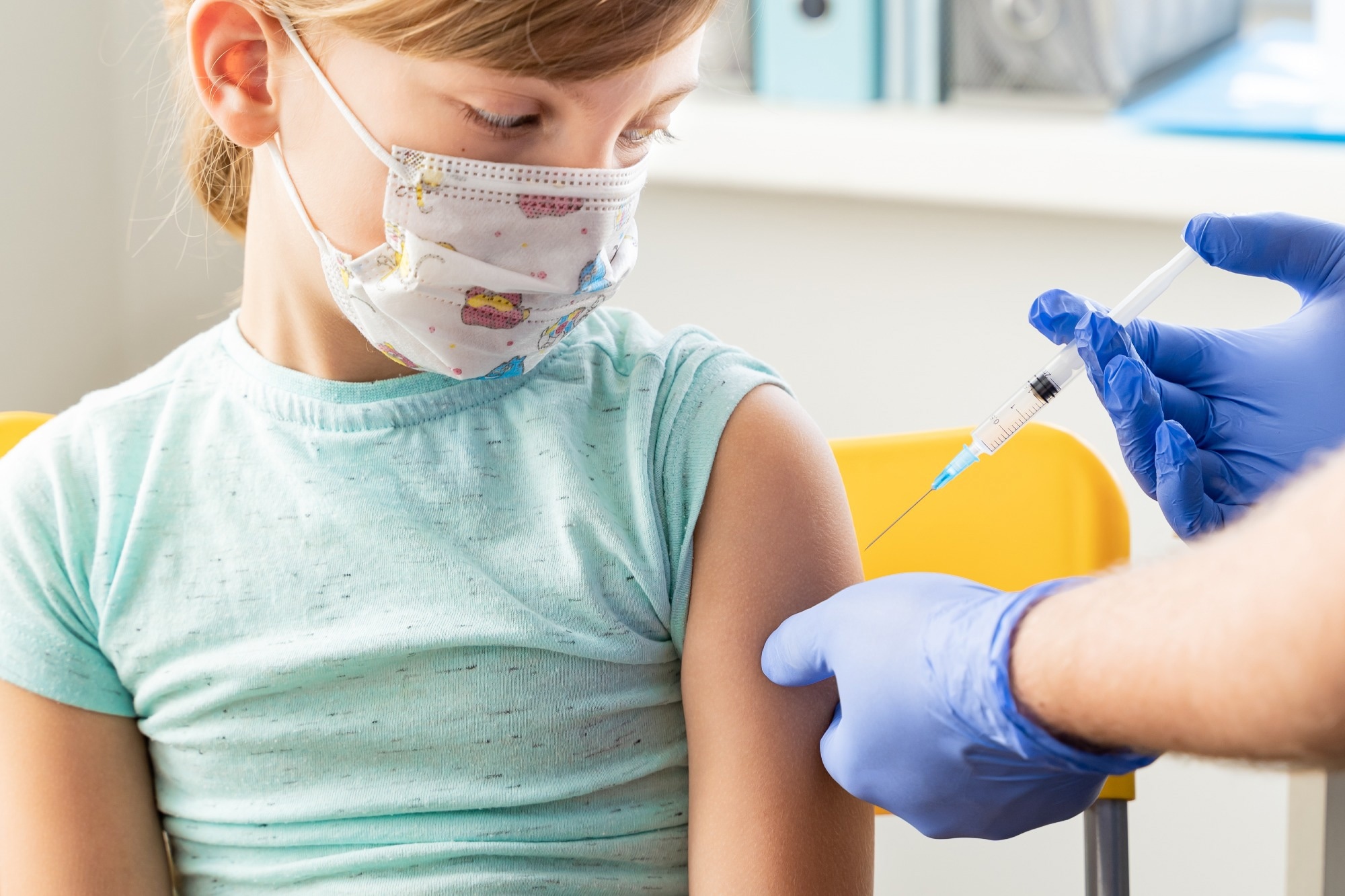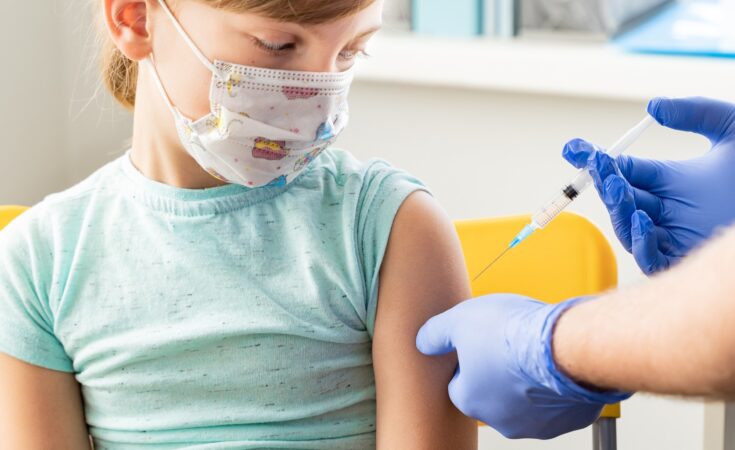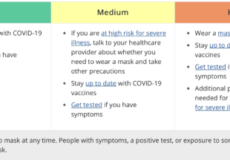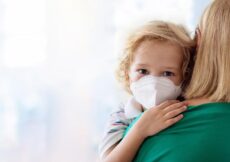In a recent study published in the New England Journal of Medicine, researchers evaluated the effectiveness of the BNT162b2 vaccine against the new severe acute respiratory syndrome coronavirus 2 (SARS-CoV-2) variant of concern (VOC) Omicron in five to 11-year-old children.
Only a few studies have evaluated the effectiveness of the messenger ribonucleic acid (mRNA)-based SARS-CoV-2 vaccine BNT162b2 in real-world settings. Moreover, there is little evidence of its efficacy in preventing Omicron infections in five to 11-year-old children.

About the study
In the present study, researchers identified a cohort of children five to 11 years of age vaccinated for coronavirus disease 2019 (COVID-19) on or after November 23, 2021, with BNT162b2 in Israel. They compared whether vaccination prevented them from Omicron infection vis-à-vis matched unvaccinated controls. They documented vaccine effectiveness (VE) against asymptomatic and symptomatic cases from 14 to 27 days after the first and seven to 21 days after the second BNT1262b dose(s).
The team estimated the cumulative incidence (risk) of each outcome in the test and control groups using the Kaplan–Meier estimator till January 7, 2022. Further, they computed VE for different age subgroups (five or six years, seven to nine years, and 10 or 11 years). They defined VE as one minus the risk ratio. Notably, they also estimated the proportion of Omicron cases daily. They used patient samples sequenced by the Israeli Ministry of Health after testing COVID-19-positive by reverse transcription-polymerase chain reaction (RT-PCR).
Study findings
Although 136,127 children covered by the Clalit Health Services (CHS) were eligible for the study, the final study population comprised 94,728 vaccinated children and an equal number of unvaccinated controls. In addition, the CHS mandated that all these children had a minimum of 12 months of the CHS membership, no previous positive RT-PCR test, a valid residence in Israel, and no interaction with the health care personnel or hospital within three days before enrolling in the study.
The two study groups had similar COVID-19 testing rates and risk factors for severe COVID-19. Likewise, the test and control groups had a similar incidence of SARS-CoV-2 infections and symptomatic COVID-19 at the beginning of the follow-up. However, slight divergences became noticeable for both the study outcomes after day 28.
The median age of the study population was eight years, with 49% female and 17% obese children. The average time of follow-up after the first vaccine dose was 17 days. At 14 to 27 days after the first vaccine dose, the authors noted a VE of 17% and 18% against SARS-CoV-2 infection and symptomatic COVID-19, respectively. During seven to 21 days after the second vaccine dose, VE against SARS-CoV-2 infection and symptomatic COVID-19 was 51% and 48%, respectively.
Omicron was responsible for an estimated two-thirds of new infections among children who had received a two-dose regimen of BNT1262b by December 21, 2021. By December 31, 2021, more than 85% of the identified cases were due to Omicron breakthrough infections. The subgroup analyses showed that VE against SARS-CoV-2 infection was 68% in five to six-year-olds. In the seven to nine years age group, VE was 56%, and among children 10 or 11 years of age, VE was 38%.
Conclusions
Walter et al. showed that the estimated VE of BNT1262b against symptomatic COVID-19 was higher against the SARS-CoV-2 Delta VOC, close to 91%. In the current study, the VE of BNT1262b against symptomatic COVID-19 against Omicron was barely 48%. However, Walter et al. documented only one event in both study groups before day 28 following vaccination, while the authors documented two events. Another recent study estimated VE against Omicron between 30% to 68% for adults and adolescents. However, these VE estimates might not apply to young children because their vaccine dosage and immunity differ from adolescents and adults.
The Pediatric Research Observing Trends and Exposures in COVID-19 Timelines (PROTECT) study estimated a VE of 31% against Omicron among 1052 children between five to 11 years of age. However, in the current study, the authors observed minimal VE or risk differences between the vaccinated and unvaccinated children after the first vaccine dose. The majority of differences between the two study groups emerged only after the second vaccine dose.
Overall, the vaccination with BNT162b2 conferred moderate protection among five to 11-year-old children. The protection conferred by BNT1262b was not uniform across all the age groups; however, BNT1262b showed the highest effectiveness against SARS-CoV-2 infection and symptomatic COVID-19 in the youngest age group comprised of children five or six years old. Future studies should evaluate long-term VE among children to aid in developing appropriate age-based vaccination strategies and further investigate the potential dose effect in different age groups of children and other subpopulations.
Journal reference:
- BNT162b2 Vaccine Effectiveness against Omicron in Children 5 to 11 Years of Age, Chandra J. Cohen-Stavi, Ori Magen, Noam Barda, M.D., Shlomit Yaron, Alon Peretz, Doron Netzer, Carlo Giaquinto, Ali Judd, Leonard Leibovici, Miguel A. Hernán, Marc Lipsitch, Ben Y. Reis, NEJM 2022, DOI: 10.1056/NEJMoa2205011, https://www.nejm.org/doi/full/10.1056/NEJMoa2205011


































